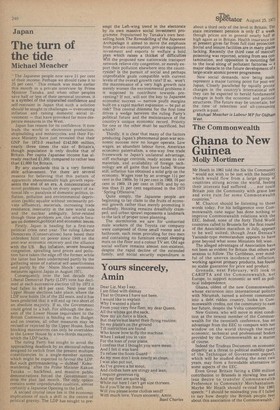The Commonwealth
Ghana to New Guinea
Molly Mortimer
Mr Heath in 1961 told the Six the Communiq "would not wish to be met with the hostility which would flow from a large group of countries strung across the world, feeling their interests had suffered . . nor could Britain join the Community with grave los:, and even ruin for some Commonwealth countries."
M. Charcot should be listening to those words today. For his belligerence over Commonwealth cane sugar has done nothing to improve Commonwealth relations with the EEC. Indeed, none of the forty Third World countries called to Brussels for the first round of the Association marathon in July, appears to be well suited; though Jean Deniau's Yaounde-type memorandum appears to have gone beyond what some Ministers felt wise.
The alleged advantages of Association have not been so evident for Britain that others are anxious to follow. The Caribbean, ever mindful of the uneven incidence of inflation. working against primary products, has found no stable guarantee for price and product. Grenada, next February, will look to CARIFTA and the Commonwealth, not Europe, to support economic as well as political independence.
Ghana, oldest of the new Commonwealth, whose excursion into international politics with Nkrumah, turned a solvent community into a debt ridden country, looks to Commonwealth credits, not the community to ease her future, despite the Volta consortium.
New Guinea, who will move in mint condition as the newest member of the Commonwealth for the twentieth conference, has no advantage from the EEC to compare with her window on the world through the many economic, technical and professional bodies provided by the Commonwealth as a matter of course.
Indeed the Trudeau Document on economic disparity as a threat to political stability (part of the Technique of Government paper), which will be studied during the next two years, may form a formidable alternative to some aspects of the EEC.
Even Great Britain facing a £500 million contribution to Brussels is showing less and less desire to transfer Commonwealth, Preference to Community Merchantalism, Maybe Mr Heath should re-read his 1961 speech: "I should be misleading you if I failed to say how deeply the British people feel about this association of the Commonwealth."


































 Previous page
Previous page